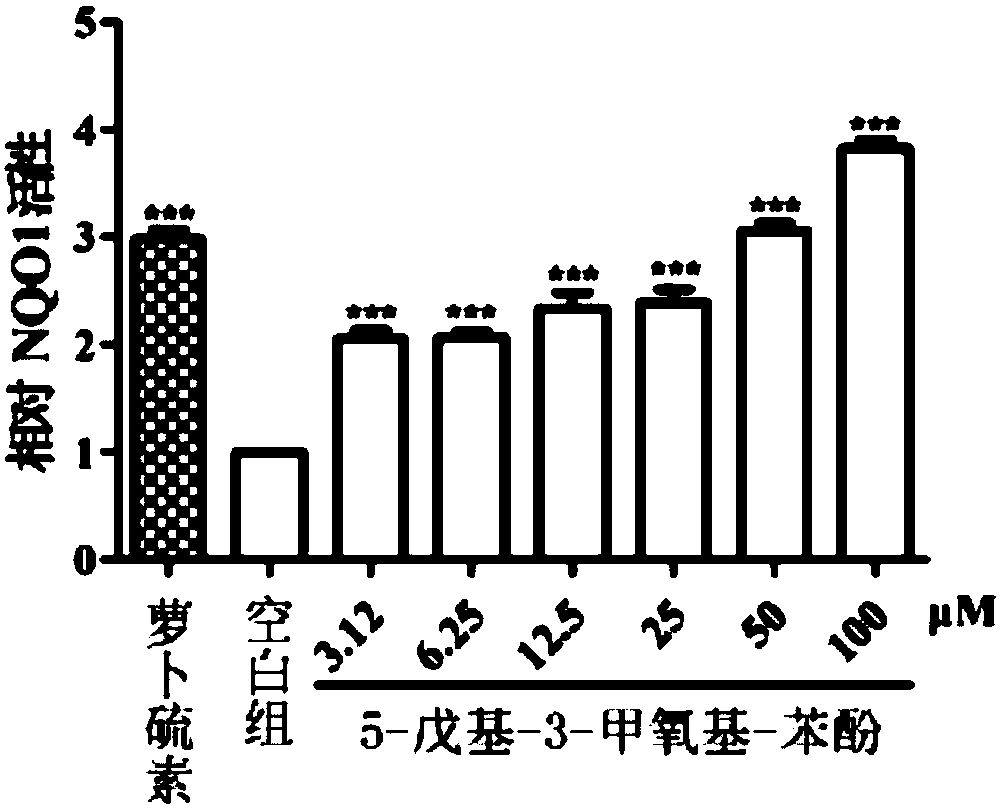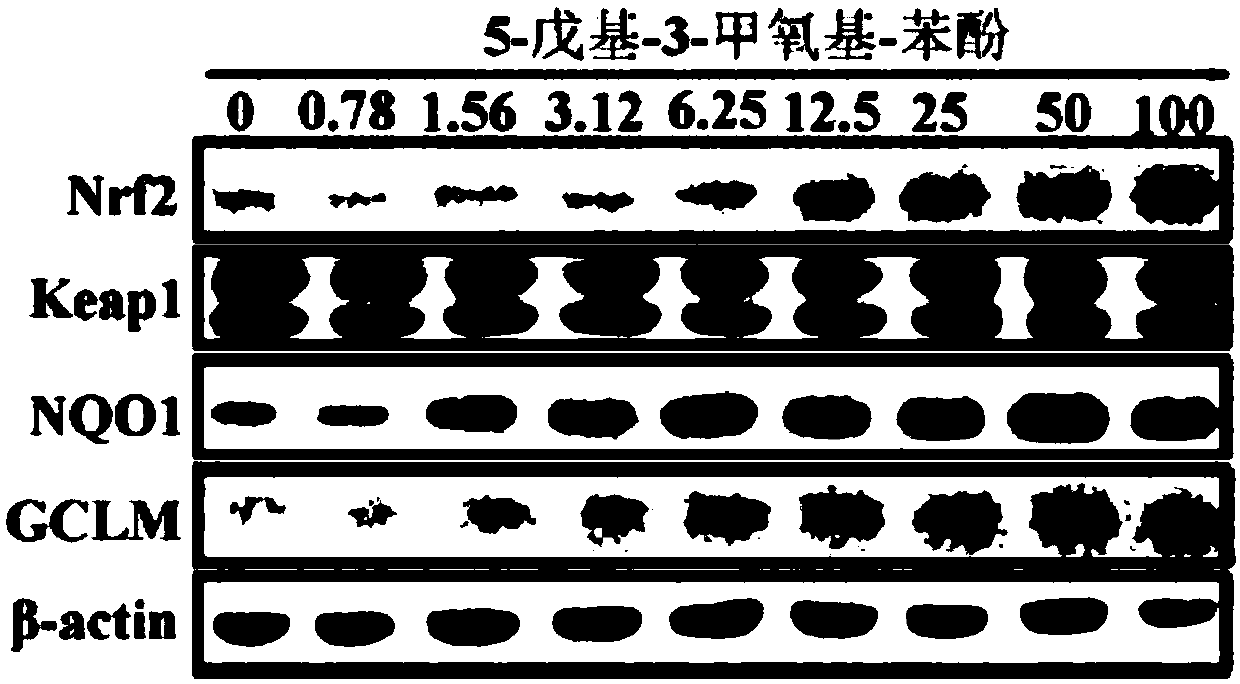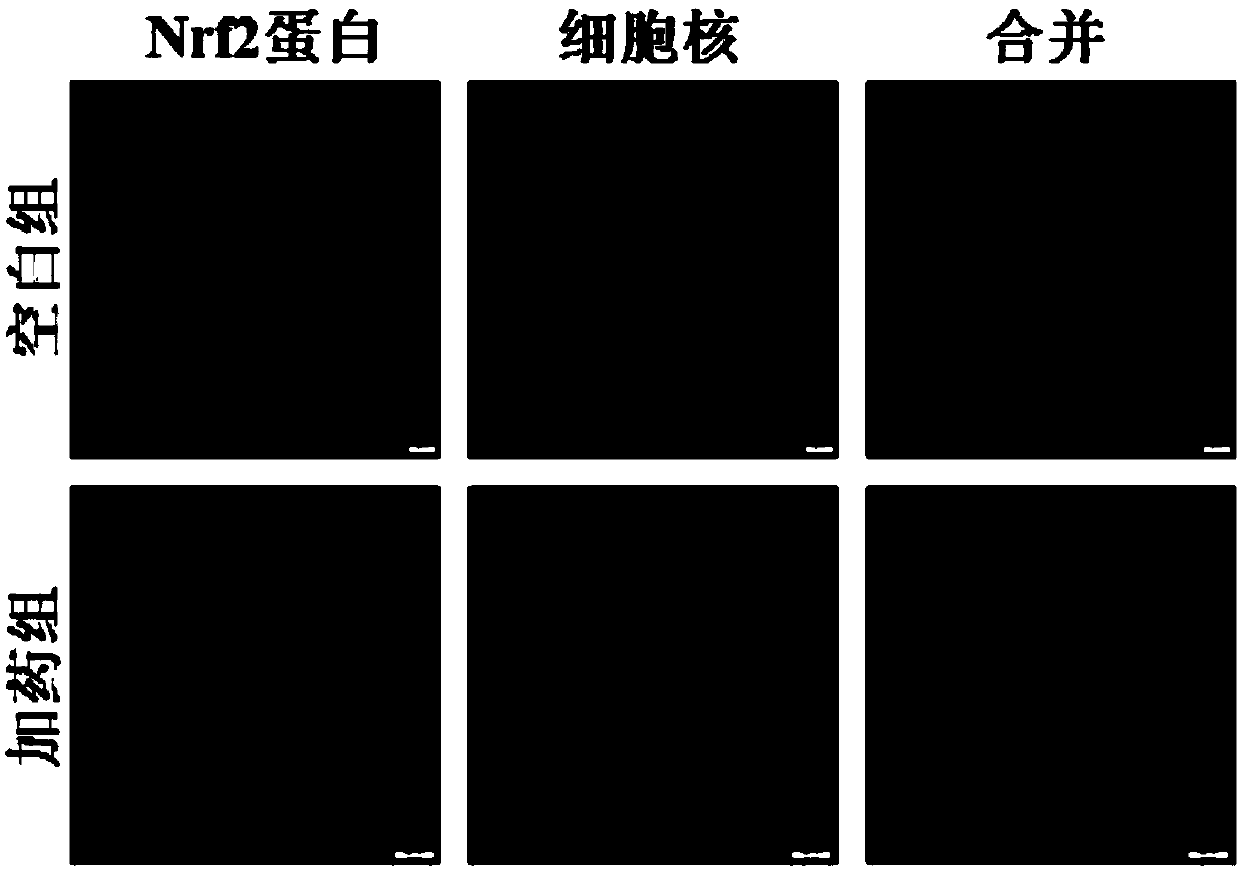Application of 5-pentyl-3-methoxy-phenol to preparation of products for preventing and treating oxidative stress or inflammatory response induced diseases
A technology of oxidative stress and inflammatory response, applied in the field of medicine, can solve the problems of less research on the chemical constituents of P. japonicus and the evaluation of the biological activity of chemical constituents.
- Summary
- Abstract
- Description
- Claims
- Application Information
AI Technical Summary
Problems solved by technology
Method used
Image
Examples
Embodiment approach
[0033] A typical embodiment of the present application provides the application of 5-pentyl-3-methoxy-phenol in the preparation of oxidative stress or inflammatory response induced disease prevention products. The 5-pentyl-3-methoxy The chemical formula of base-phenol is:
[0034]
[0035] This application has discovered through research that 5-pentyl-3-methoxy-phenol can up-regulate the protein levels of Nrf2 and its phase II detoxification enzyme NQO1 and antioxidant enzyme GCLM, and inhibit the production of excessive endogenous reactive oxygen species induced by arsenic Its activation mechanism is achieved by increasing the stability of Nrf2 protein and inhibiting Nrf2 protein degradation; at the same time, down-regulating the excessive endogenous reactive oxygen species induced by arsenic can also weaken the activation of NF-κB signaling pathway, down-regulate the expression of inflammatory genes, and protect the body from the environment. The hazards of pollutants. In orde...
Embodiment 1
[0055] Example 1: Structural confirmation of 5-pentyl-3-methoxy-phenol
[0056] The above-ground part of Magnolia sibiricum was extracted with 95% ethanol to obtain an ethanol extract, which was then extracted with petroleum ether, ethyl acetate and n-butanol in sequence. The petroleum ether part is eluted with a petroleum ether-ethyl acetate system gradient, and the concentrations are pure petroleum ether, petroleum ether-ethyl acetate=95:5 (volume ratio), petroleum ether-ethyl acetate=90:10 (volume ratio) ), petroleum ether-ethyl acetate=85:15 (volume ratio), petroleum ether-ethyl acetate=80:20 (volume ratio), petroleum ether-ethyl acetate=75:25 (volume ratio), petroleum ether- Ethyl acetate=70:30 (volume ratio), petroleum ether-ethyl acetate=60:40 (volume ratio), petroleum ether-ethyl acetate=50:50 (volume ratio), petroleum ether-ethyl acetate=40 : 60 (volume ratio), 100% ethyl acetate to obtain 14 parts (Frs. 1-14). Part Fr.8 (eluted with petroleum ether-ethyl acetate=90:10...
Embodiment 2
[0059] Example 2: Evaluation of NQO1 inducing activity of 5-pentyl-3-methoxy-phenol
[0060] (1) Cultivation of hepa 1c1c cell line of mouse liver cancer cells
[0061] Mouse hepatocarcinoma cell line hepa 1c1c was purchased from the American Model Culture Collection (ATCC), using MEM medium containing 10% fetal bovine serum (FBS), placed at 37°C, 5% CO 2 Cultivate in an incubator.
[0062] (2) NQO1 induction activity test
[0063] Hepa 1c1c cells were seeded on a 96-well plate, and after the cells adhered, 5-pentyl-3-methoxy-phenol of different concentrations (confirmed in Example 1) was added, treated for 24 hours, and lysed with 0.8% digitalis saponin solution Cells, add detection solution (1.0mL 0.5M Tris-HCl), 15mg bovine serum albumin, 6mg MTT, 150μL Tween-20, 150μL 150mM D-glucose-6-phosphate, 15μL 7.5 mM flavin adenine dinucleotide, 27 μL 50 mM nicotinamide adenine dinucleotide phosphate, 20 μL 50 mM menadione), placed for 3 minutes, and measured the luminous intensity at 630...
PUM
 Login to View More
Login to View More Abstract
Description
Claims
Application Information
 Login to View More
Login to View More - Generate Ideas
- Intellectual Property
- Life Sciences
- Materials
- Tech Scout
- Unparalleled Data Quality
- Higher Quality Content
- 60% Fewer Hallucinations
Browse by: Latest US Patents, China's latest patents, Technical Efficacy Thesaurus, Application Domain, Technology Topic, Popular Technical Reports.
© 2025 PatSnap. All rights reserved.Legal|Privacy policy|Modern Slavery Act Transparency Statement|Sitemap|About US| Contact US: help@patsnap.com



